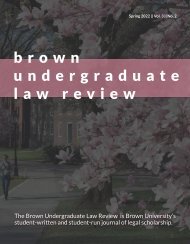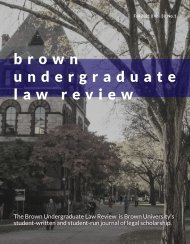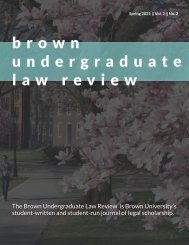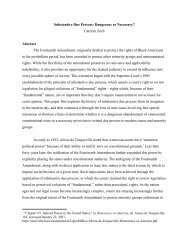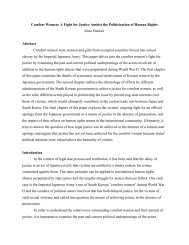Brown Undergraduate Law Review -- Vol. 2, No. 1 (Fall 2020)
We are proud to present the Brown Undergraduate Law Review's Fall 2020 issue. We hope you will all find our authors' works fascinating and thought-provoking.
We are proud to present the Brown Undergraduate Law Review's Fall 2020 issue. We hope you will all find our authors' works fascinating and thought-provoking.
You also want an ePaper? Increase the reach of your titles
YUMPU automatically turns print PDFs into web optimized ePapers that Google loves.
The Kosovo War: Wartime Sexual Violence Jurisprudence and State Action Toward Recovery
Right to a Remedy and Reparation for flagrant violations
of international humanitarian and human rights law, which
include five forms of reparation: restitution, compensation,
post-war governmental regimes, and international and
domestic non-governmental organizations. The Rome
Statute of 1998 was monumental in its codification of
rehabilitation, satisfaction, and guarantees of sexual violence and creation of the International Criminal
non-repetition. Only recently has the government begun to
contribute to these reparative measures through the
pension program and the recognition of survivors?status
under law. However, Serbia has yet to accept survivors?
allegations or contribute monetarily to victims of wartime
rape. In fact, Amnesty International writes scathingly that
?Serbia has overwhelmingly failed in its responsibility to
bring Serbian police, paramilitaries and members of the
Yugoslav Army to justice, despite the undeniable body of
evidence for their criminal responsibility.? 52
The Kosovo War thus demonstrates how sexual violence
can be systematically implemented as a weapon of war, as
well as how its damaging ramifications can be felt long
after war ends. It also illustrates how the framing of rape as
a weapon of war can reshape conceptions of women?s
human rights. While wrongs were committed on both sides
during the conflict, Milo?evi??s Serbia is responsible for
the rapes of 20,000 Albanian Kosovars but has yet to
accept responsibility for these crimes. Although Kosovo?s
Court, and gleanings from the Kosovo War were
instrumental in the statute?s creation. However, the
problem of sexual violence as a weapon of war extends far
beyond Kosovo. In the second half of the 20th century
alone, infamous conflicts throughout the Balkans, Rwanda,
the Democratic Republic of the Congo, Colombia, and
elsewhere were also characterized by the pernicious use of
rape. Moreover, despite international human rights
jurisprudence, rape is used as a highly effective weapon of
war and genocide even today. In the ongoing Rohingya
genocide in Myanmar, rape is utilized strategically to
subjugate the Rohingya population and drive it out of the
Rakhine State. 53 Similarly, Muslim Uyghur women have
been specifically targeted in the Chinese government?s
campaign of ethnic cleansing: they are forcibly sterilized,
raped, and separated from their children, all of which
constitute crimes against humanity. 54
As the Kosovo case demonstrates, a state?s process of
recovery from horrific wartime violence is long, arduous,
survivors continue to be plagued by cultural stigma and and uncertain. President Jahjaga?s empathetic,
physical and psychological trauma, President Jahjaga?s compassion-driven efforts toward implementing
administration ushered in a new era of support and
compensation for victims. However, key groups of other
survivors of sexual and other wartime violence have yet to
be validated in their quest to receive support and
reparations.
It is imperative that weaponized rape receives the
multifaceted recognition and handling that the Kosovo
case highlights? from the international legal system,
therapeutic healing infrastructure, distributing reparations,
and pursuing justice for survivors have yielded promising
results, allowing survivors to feel seen and heard.
Shortcomings aside, her administration?s targeted approach
to addressing the ramifications of weaponized sexual
violence should serve as a compassionate and just model to
other nations whose survivors continue to struggle in the
wake of war. Moreover, as Serbia continues to evade
52. Amnesty International, 28.
53. Thalisma Begum, ?Opinion: Rape Is Not a by-Product of War in Myanmar ? It Is a Strategy of It,? The Independent, December 9, 2019,
www.independent.co.uk/voices/war-myanmar-burma-rohingya-muslims-a9239521.html.
54. Elizabeth M. Lynch, ?China?s attacks on Uighur women are crimes against humanity,? The Washington Post, October 21, 2019,
https://www.washingtonpost.com/opinions/2019/10/21/chinas-attacks-uighur-women-are-crimes-against-humanity/.
Brown Undergraduate Law Review
18




